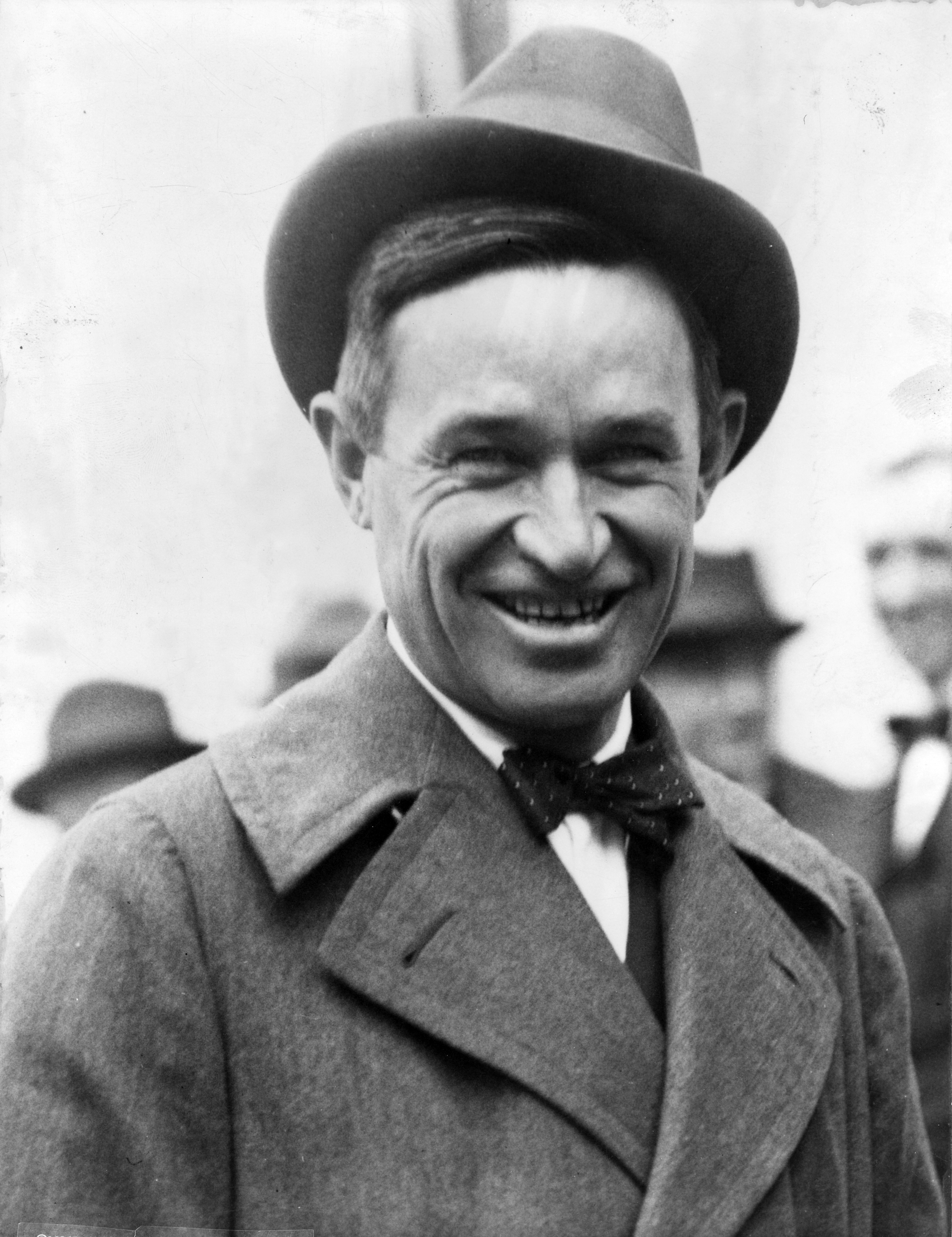In 1935, Will Rogers was invited along on a trip to determine an air route through the Alaskan Territory in an experimental plane by his friend, one-eyed pilot Wiley Post. Will, always up for a new opportunity, agreed and decided to cover the trip in his weekly New York Times column. Outside of the town of Barrow, while taking off from a lagoon, the engine failed, and the plane crashed in shallow water. Wiley Post was killed instantly, but Rogers survived with internal bleeding and head wounds. Locals managed to rescue him and nurse him back to health.
The crash would prove a life-changing moment for Will. His had been a life full of changing moments already: his beloved mother had died when he was 11, he had escaped from military school, worked as a cowboy in Oklahoma and a gaucho in Argentina, joined Texas Jack's Wild West Circus in South Africa, performed rope tricks and, later, comedy in Vaudeville, made dozens of films in Hollywood as one of the highest paid actors through the 1920s, and wrote for numerous newspapers and magazines as well as performing on radio and lecture tours. Movie camera technology, travel, and aviation also fascinated him, and he was delighted to go with Post on the journey.
When he was well enough to travel, he returned to his California ranch amid great applause for his recovery. Will had given much thought to his life and decided that he needed to give more back to his fellow man. Recovery through the Great Depression was slow, and Will worked as hard as he could to bolster morale, stimulate industry, and serve as guest speaker for innumerable fundraisers. When World War II broke out, Will was a staunch supporter of neutrality until the bombing of Pearl Harbor, when he joined the war effort, leading many entertainers to do the same. When asked about his change, Will said, “Back in the schoolyard there was a valuable code: when a bully hits you, you hit him back until you knock him down so hard he'll never hit you again. Then you offer a hand to help him up. I see no reason this can't apply to international relations as well.”
Will worked the Home Front with his columns of support and several films, including 1942's Real Men, for which he beat out Walter Huston for the Academy Award for Best Supporting Actor. As the war progressed, Will's wife became ill with cancer, and he retreated from the public life to care for her. She passed away in 1944, three years after writing her book Will Rogers: His Wife's Story. For days after her death, Will was nearly inconsolable with grief, but gradually he returned to the public, where he seemed to find new life.
In July, Will attended the Democratic National Convention in Chicago as a special guest. While there, he became aware that many were hoping he would be voted in as Vice-President since Henry Wallace had irked too many with his overly leftist ideals. Will had only minor political experience, being a goodwill ambassador to Mexico and mayor of Beverly Hills, but he had learned much from his efforts with the Great Depression and the war. At FDR's request, he put his hat in and was easily confirmed. The election in November was a runaway.
Will settled into Washington and continued much of the same work he had already done, and he joked, “At least I'm getting a paycheck. Not much of one, but it covers the taxes on it.”
Tragedy struck in 1945 when Roosevelt died in Warm Springs, Georgia, but the nation was proud to have Rogers sworn in as president. Relying on many of the same wartime aides, Rogers kept the policies of FDR running smoothly and hoped the end of war was in sight. One month later, Germany surrendered, and America under Will turned their attention to the Pacific. In July, the successful testing of the atomic bomb at Trinity gave Will a weapon to end the war, but he was hesitant to use it. Later, it was said that he commented, “Every time somebody gets a bigger gun, somebody's got to get a bigger one. Bigger and bigger, where will it all end?”
In August, after hearing reports of the estimated one million American casualties upon an invasion of Japan, Will gave the order to drop the bomb. While the war came to an end, Will was never the same person. Aides complained that he refused to listen to reports about radioactive fallout. When told of the cancer rates among survivors, it was said that Will turned ghastly pale and did not speak for over three minutes. Most famously, while the rest of America applauded the bomb, when asked to comment on it, Will said coldly, “There's nothing funny about that.”
In 1948, Will refused to run for reelection, despite Democratic Party officials literally begging him. Senator Harry S Truman was narrowly defeated by Republican Thomas Dewey, which began a twelve-year post-war Republican period that lasted until the Kennedy administration. Will, meanwhile, retired to California, writing and receiving visitors, but rarely leaving his ranch. He died in July of 1958 and given a national day of mourning as America's Native Son.
–
In reality, Rogers was killed in the crash in Alaska. It was an especially dark time in the dark days of the Great Depression. Even though he was a comedian and not officially an American leader, Congress closed its doors in honor of him, the same sentiment as was felt throughout the United States. It was said that the nation ground to a halt in mourning for a week.

As a (nearly) life-long fan of the man and his writings, I find this scenario entirely plausible. Well done!
ReplyDelete